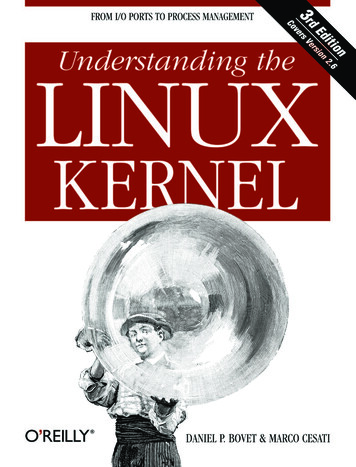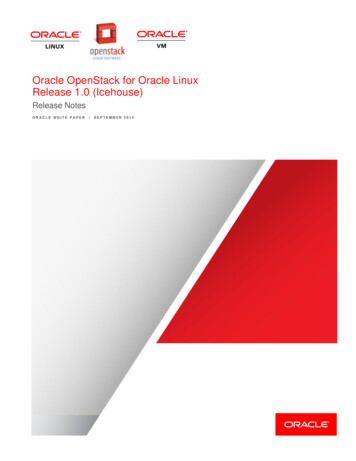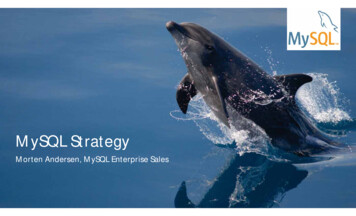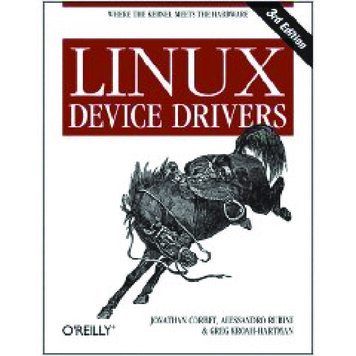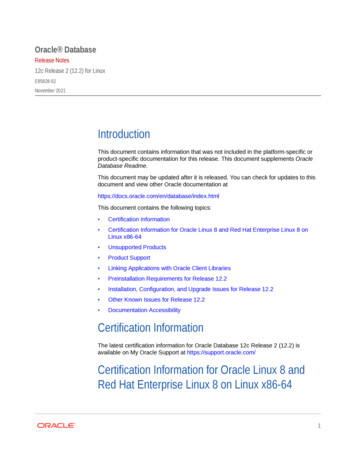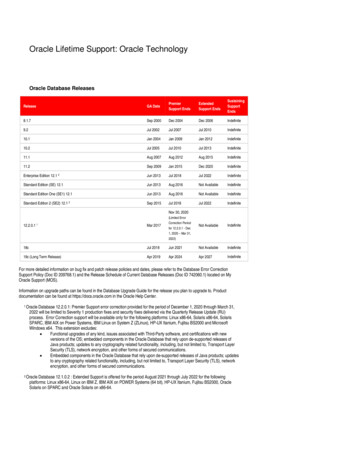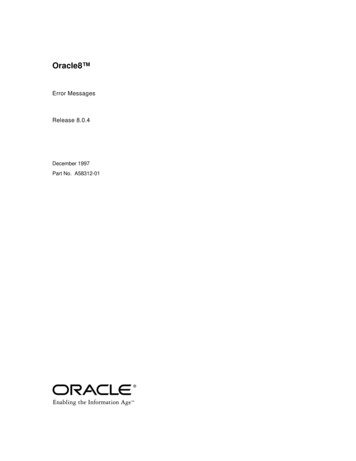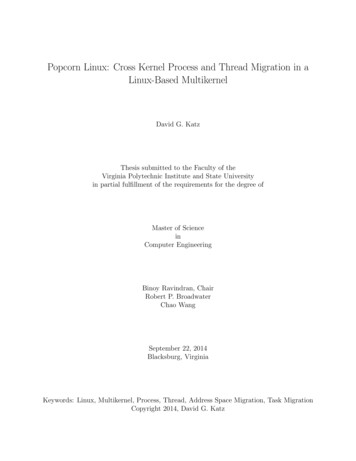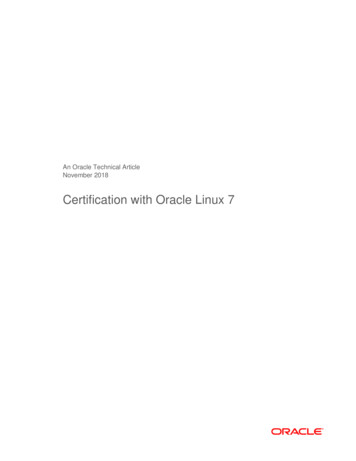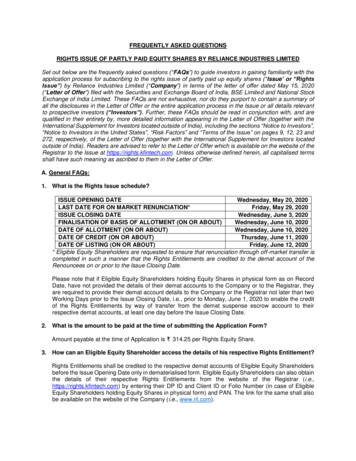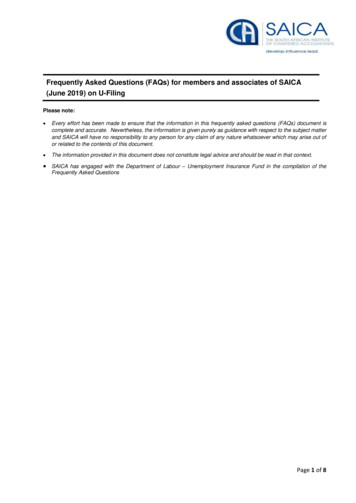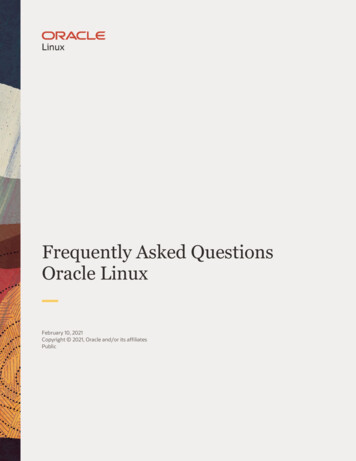
Transcription
Frequently Asked QuestionsOracle LinuxFebruary 10, 2021Copyright 2021, Oracle and/or its affiliatesPublic
INTRODUCTIONThis document answers commonly asked questions about Oracle Linux. If you don’t see the information you need, pleasefeel free to connect with us via Twitter, Facebook or via LinkedIn.What is Oracle Linux? The Oracle Linux operating environment delivers leading performance, scalability and reliability for business-criticalworkloads deployed on premise or in the cloud. Oracle Linux is the basis of Oracle Autonomous Linux and is used torun Oracle Cloud Infrastructure.Unlike many other commercial Linux distributions, Oracle Linux is easy to download and completely free to use,distribute, and update. Oracle Linux is available under the GNU General Public License (GPLv2). Support contracts areavailable from Oracle.What is the Unbreakable Enterprise Kernel (UEK) for Oracle Linux? The Unbreakable Enterprise Kernel (UEK) for Oracle Linux provides the latest open source innovations and businesscritical performance and security optimizations for cloud and on-premise deployment. It is the Linux kernel that powersOracle Cloud Infrastructure and Oracle Engineered Systems such as Oracle Exadata Database Machine.Oracle Linux is application binary compatible with Red Hat Enterprise Linux whether running the UnbreakableEnterprise Kernel or Oracle’s alternative Red Hat compatible kernel. Existing applications run unchanged with theUnbreakable Enterprise Kernel because all system libraries remain unchanged.The Unbreakable Enterprise Kernel, the default kernel for Oracle Linux, is available for 64-bit Intel and AMD (x86-64)and 64-bit Arm (aarch64) systems.What are Ksplice zero-downtime updates? Ksplice zero-downtime updates are available to Oracle Linux Premier Support customers at no additional cost. Ksplicepatches the Oracle Linux operating system kernel and select user space libraries while the system is running, without areboot or any service interruption. This unique capability enables you to stay current with important Linux updateswithout the operational cost and disruption of scheduling maintenance windows and the risk of rebooting the operatingsystem.You can use Ksplice for rebootless updates of Oracle Linux whether you are using the Unbreakable Enterprise Kernel orthe Red Hat compatible kernel.Read more about how to get started with Ksplice.What is Oracle Linux Cloud Native Environment? Oracle Linux Cloud Native Environment is an integrated software suite for the development and management of cloudnative applications. Based on the Open Container Initiative (OCI) and Cloud Native Computing Foundation (CNCF)standards, Oracle Linux Cloud Native Environment delivers a simplified framework for installations, updates, upgrades,and configuration of key features for orchestrating microservices.For more information about Oracle Linux Cloud Native Environment, please see Getting Started.Does Oracle Linux Support include support for KVM? KVM is supported as part of Oracle Linux support subscriptions. Oracle Linux Virtualization Manager, the servervirtualization management platform, can be easily deployed to configure, monitor, and manage an Oracle Linux Kernelbased Virtual Machine (KVM) environment with enterprise-grade performance and support from Oracle.1FAQ Oracle LinuxCopyright 2021, Oracle and/or its affiliates Public
In addition, Oracle VM Server for x86 is Oracle’s free server virtualization software that supports both Oracle and nonOracle applications. Oracle VM helps increase IT efficiency and agility while reducing operations and support costs.Learn more about Oracle VM Server for x86.Can Oracle Linux KVM be used as hard partitioning technology for Oracle software license? Yes. Oracle Linux KVM may be used as hard partitioning technology only if specific cores are allocated per the followingdocument – Hard Partitioning with Oracle Linux KVM.Is Oracle Clusterware software included with Oracle Linux Support? Yes. Oracle Linux Support customers at the Basic and Premier support levels can download and deploy OracleClusterware at no additional license fee or support cost.Oracle Clusterware provides server failover capability that helps protect Oracle and non-Oracle applications. It can be avaluable component of a business continuity infrastructure for applications and databases managed in a clusterenvironment—including Oracle Application Servers, Oracle Enterprise Manager components, third-party databases, andother applications. For more information, visit Oracle Clusterware.Does Oracle provide support for high availability solutions built with open-source packages, including Corosync andPacemaker? Yes. Beginning with Oracle Linux 7, Oracle Linux includes several open-source packages, including Corosync andPacemaker, to provide the tools to achieve high availability for applications and services. You may download Corosync,Pacemaker and the functional sub packages from the Unbreakable Linux Network at https://linux.oracle.com or theOracle Linux yum server at https://yum.oracle.com.What is DTrace for Oracle Linux? DTrace is a comprehensive dynamic tracing framework available to Oracle Linux customers. DTrace is designed to giveoperational insights that allow users to tune and troubleshoot the operating system. DTrace provides Oracle Linuxdevelopers with a tool to analyze performance and increase observability into systems, to see how they work. DTraceenables higher quality applications development, reduced downtime, lower cost and greater utilization of existingresources. Visit Oracle Linux Documentation to learn how to use DTrace on respective Oracle Linux releases.Does Oracle provide support for Red Hat Global File System (GFS) or Red Hat Cluster Suite (RHCS)? Beginning with Red Hat Enterprise Linux 6, several features were separated into add-ons, requiring a separatepurchase, such as the High Availability Add-On for clustering and the Resilient Storage Add-On for GFS2. Oracle LinuxSupport does not include support for these add-ons.Oracle Linux already includes the Oracle Cluster File System (OCFS2). Developed by Oracle, OCFS2 is a shared storagefile system integrated into the Linux kernel (2.6.16 and higher) and released under the GNU General Public License.Does Oracle provide support for the Red Hat Scalable File System add-on? The Red Hat Scalable File System Add-on is a solution which incorporates the Linux XFS file system and is available, foran additional cost per socket-pair, with the Red Hat Enterprise Linux Server subscription.Oracle Linux customers with Premier Support subscriptions can receive support for XFS on Oracle Linux 6 at noadditional charge. With Oracle Linux 7 and Oracle Linux 8, XFS is the default file system and is included with Basic andPremier Support subscriptions at no additional charge. This support includes both the Unbreakable Enterprise Kernel(UEK) and the Red Hat compatible kernel. For the Unbreakable Enterprise Kernel, you must use Release 2 or higher.ORACLE LINUX SUPPORT OFFERINGSWhat does Oracle deliver with its Linux support? The Oracle Linux Support Program delivers 24x7 support for Oracle Linux and Red Hat Enterprise Linux. Technicalsupport is provided by dedicated Linux support experts via My Oracle Support, the well-established supportinfrastructure for all Oracle products and backed by an industry-leading Linux engineering team.Oracle also provides: 2free installation binaries and errata for Oracle Linux;comprehensive testing and optimization of Linux with third-party hardware, storage, networking and drivers;support for the complete software stack including enterprise applications, middleware, database, Linux,virtualization, servers and storage;services and expertise for installation, configuration and full Linux stack deployment.FAQ Oracle LinuxCopyright 2021, Oracle and/or its affiliates Public
What levels of Linux support are available? Oracle offers two levels of Linux support.Basic—24x7 global support, complete Linux server lifecycle management using Oracle Linux Manager or OracleEnterprise Manager, Oracle Clusterware software, Docker container support.Premier—24x7 global support, with all of the features of Basic support plus: Premier backports; Oracle Lifetime Support; DTrace for diagnostics and application stack tracing; Ksplice for zero-downtime updates; Gluster Storage; Software Collections; Oracle Linux Cloud Native Environment; Oracle Linux high availability services with Corosync and Pacemaker; and more.Who can take advantage of Oracle’s Linux support services? Anyone can purchase support for Oracle Linux, Red Hat Enterprise Linux and CentOS installations.What is Oracle’s support lifecycle for Oracle Linux? Our customers depend on the Oracle Linux operating system to run many of their most important IT systems. As part ofour commitment to long term stable availability of our operating system, Oracle Linux Premier Support and OracleLinux Basic Support for Oracle Linux program releases 5, 6, 7, and 8 will be available for ten years from the date arelease of the Oracle Linux program becomes generally available. Support for Oracle Linux program may be extendedfor an additional three years with Oracle Linux Extended Support, followed by lifetime Sustaining Support. This is justpart of Oracle’s unique Lifetime Support Policy that enables customers to move to new versions of software whenthey're ready. Refer to the Oracle Linux and Oracle VM Support Policies and the Lifetime Support Policy: Coverage forOracle Linux and Oracle VM documents for details.Does Oracle offer Extended Support? Yes. When available, Oracle will provide Extended Support for Oracle Linux once Premier Support has ended. For moreinformation on Extended Support, please review the Oracle Linux Extended Support datasheet.Is Oracle Linux Support available in Oracle Cloud? Yes, Oracle Linux Premier Support is included with Oracle Cloud Infrastructure subscriptions, at no additional cost. Thisincludes support for additional Oracle Linux features and tools that integrate with, and enhance the cloud platformexperience on Oracle Cloud Infrastructure. Refer to the Oracle Linux for Oracle Cloud Infrastructure FAQ for moreinformation on Oracle Linux support, licensing, deployment, and other resources, for Oracle Cloud Infrastructure.Is Oracle Linux Support included with Oracle x86 servers? Yes, when you purchase Oracle x86 servers with Premier Support for Systems, Oracle Linux Premier Support is included(as well as support for Oracle VM and Oracle Solaris). Read more about Oracle Premier Support for Systems.On which hardware architectures is Oracle Linux supported? Oracle Linux is supported on x86 (32 bit), x86-64 (64 bit) and aarch64 (64 bit) hardware.Where can I find details about certified hardware for Oracle Linux? You can read more about certified hardware for Oracle Linux here.Are third party applications supported on Oracle Linux? Thousands of leading technology partners—independent software vendors and hardware vendors—certify theirproducts with Oracle Linux. Their products work out-of- the-box with Oracle Linux because it is application binarycompatible with Red Hat Enterprise Linux. Visit our website to learn how to certify hardware and applications on OracleLinux. Also, Oracle has strategic development and support partnerships with key industry vendors that run on Linux.3FAQ Oracle LinuxCopyright 2021, Oracle and/or its affiliates Public
How much do I pay for Linux support from Oracle? Oracle’s pricing for Linux support is simple and flexible. Support pricing is calculated on a per-system basis andcustomers can choose any level of support on each server in their deployment.Premier Support is included with Oracle Cloud Infrastructure subscriptions and Oracle Premier Support for Systems, atno additional cost.Please see the Oracle corporate price list for further details.Does Oracle indemnify users against intellectual property infringement claims? Yes. Oracle is committed to the success of the Linux operating system and will stand behind its support offering byproviding indemnification for intellectual property claims raised against our customers. This indemnification is offeredfor all Linux users supported by Oracle and is included with Oracle Linux Support. The indemnification is not in any waylimited to the amount of money a customer has paid Oracle. Oracle’s indemnification offer is part of the Oracle LinuxSupport contract, which states:“Provided you are a current subscriber to Oracle Linux Support services, if a third party makes a claim against youthat any covered programs furnished by Oracle (‘material’ or ‘materials’), and used by you for your businessoperations infringes its intellectual property rights, Oracle, at its sole cost and expense, will defend you againstthe claim and indemnify you from the damages, liabilities, costs and expenses awarded by the court to the thirdparty claiming infringement or the settlement agreed to by Oracle, if you do the following: notify Oracle promptly in writing, not later than 30 days after you receive notice of the claim (or sooner if requiredby applicable law); give Oracle sole control of the defense and any settlement negotiations; give Oracle the information, authority and assistance it needs to defend against or settle the claim.”With Oracle’s offer of comprehensive and thorough indemnification against infringement, users can now deploy Linuxwithout hesitation. Oracle’s indemnification offer makes Linux an even more attractive choice for enterprisedeployments. ORACLE’S COMMITMENT TO LINUXWhy does Oracle offer Linux support? Oracle is deeply committed to delivering the industry’s best Linux support and advancing Linux technology. Oracle hasa long-standing history of supporting standards-based computing to lower the cost of IT infrastructure for customers.Linux is the most popular and fastest growing operating system for Oracle software deployments, and as such, it is veryimportant to our customers. Our customers demand the highest quality support when they deploy data center andcloud solutions using Oracle Linux.How is it possible for Oracle to provide enterprise-quality support for Linux while lowering cost? For decades, Oracle has been supporting customers’ enterprise systems in data centers around the world, with tens ofthousands of Oracle Linux customers. This means our Linux support organization can take full advantage of theeconomies of scale of Oracle and pass along the cost savings to our customers.Does Oracle use Oracle Linux to run its business and product development? Yes. Oracle uses Oracle Linux to run its business and product development. Oracle Linux powers Oracle CloudInfrastructure and Oracle Engineered Systems.How does Oracle work with the Linux community? 4Oracle is committed to developing, supporting and promoting Linux. Oracle has been a key contributor to the Linuxcommunity for many years. This includes major code contributions such as Oracle Cluster File System and the Btrfs filesystem, and much more. Oracle’s Linux engineering team is a trusted part of the Linux community and several Oracleemployees are Linux mainline kernel maintainers. Oracle continues to contribute Linux-related innovations,modifications, fixes and documentation directly to the Linux community. We strive to set the standard for collaboration.Oracle also puts tremendous effort into testing Linux to run well in enterprises. Oracle’s Linux test lab uses many testkits that are based on real customer workloads to test and stress Linux for performance, scalability, reliability andsecurity. The results of these testing efforts make their way into the Linux kernel as bug fixes and new enhancements,thereby making Linux better for all customers.Learn more about Oracle’s work with the Linux community and with other open soure projects athttps://oss.oracle.com.FAQ Oracle LinuxCopyright 2021, Oracle and/or its affiliates Public
ORACLE LINUX UPDATES AND PATCHESHow do I get updates for Oracle Linux? Oracle provides security updates and bug fixes (errata) for Oracle Linux for free from the Oracle Linux yum server onyum.oracle.com. Updates to Ksplice and Oracle Linux release under Extended Support require Oracle Linux Premier orExtended Support. Customers can freely choose which of their systems should be covered by a support subscription,and at which support level.The Unbreakable Linux Network (ULN) is a comprehensive resource for Oracle Linux Support subscribers, and offersaccess to additional Linux software (e.g. ASMlib, DTrace) as well as patches, updates and fixes. ULN is similar to Red HatNetwork (RHN). To access ULN, a valid Customer Support Identifier (CSI) is required. To obtain a CSI, purchase Linuxsupport from the Oracle Store or through your Oracle sales contact.How can users manage their Linux servers once they download patches from ULN? The base installation of Oracle Enterprise Manager 13c includes several features free of charge with the purchase of anOracle Linux Support contract. These features include server, storage and virtualization management features such as: configuration management; advanced alert management; host monitoring and management; Linux OS patching.Several additional features are also included free of charge, including:bare metal OS provisioning;compliance automation;historical monitoring.To download Oracle Enterprise Manager 13c, visit the Oracle Enterprise Manager downloads page.Oracle also provides support for Oracle Linux Manager, an open source Linux management tool based on theSpacewalk project. More information can be found in the Oracle Linux Manager Release Notes. SWITCHING TO ORACLE LINUXDoes Oracle Linux offer Red Hat Enterprise Linux compatibility? Yes, Oracle has offered application binary compatibility with Red Hat Enterprise Linux since Oracle Linux wasintroduced in 2006, with no reported issues.How does Oracle provide support for Red Hat Enterprise Linux (RHEL) or CentOS installations? Oracle Linux support subscriptions can be used to support a customer's existing RHEL or CentOS installations. ForCentOS installations, Oracle will only support systems that are based on CentOS Linux, not CentOS Stream.Support islimited to the packages and versions provided on the Oracle Linux installation media and the topics identified in theScope of Coverage document. All security and bug fix errata will be Oracle Linux binaries. However, these binaries arefully compatible and will work without any reinstallation or other coding changes.How do I obtain Oracle Linux software updates for RHEL, CentOS, or Scientific Linux? There is no need to reinstall the existing operating system such as RHEL, CentOS or Scientific Linux to obtain OracleLinux software updates. You simply register for an account with the Unbreakable Linux Network (ULN) using a validcustomer support identifier (CSI), then you download and install registration software and use it to register your server.Once you have completed these steps, you may use yum or up2date to download and install updates from ULN. TheGetting Started – How to Connect to Oracle Linux Yum Server document provides information on how to connect tothe Oracle Linux yum server and obtain software updates via yum for Oracle Linux and compatible Linux distributionssuch as Red Hat Enterprise Linux (RHEL), CentOS and Scientific Linux.What is required to cancel my Red Hat Support? Customers should check their Red Hat contract to determine what may be required to cancel Red Hat support. Oraclerecommends using Oracle Linux consulting services to assist with the transition.How do I get more information and purchase Linux support from Oracle? To get more information, visit oracle.com/linux and to purchase Linux support, visit shop.oracle.com or contact yourOracle sales representative.5FAQ Oracle LinuxCopyright 2021, Oracle and/or its affiliates Public
CONNECT WITH USCall 1.800.ORACLE1 or visit oracle.com/linux.Outside North America, find your local office at com/oraclelinuxtwitter.com/oraclelinuxCopyright 2021, Oracle and/or its affiliates. All rights reserved. This document is provided for information purposes only, and the contents hereof are subject to change withoutnotice. This document is not warranted to be error-free, nor subject to any other warranties or conditions, whether expressed orally or implied in law, including implied warrantiesand conditions of merchantability or fitness for a particular purpose. We specifically disclaim any liability with respect to this document, and no contractual obligations are formedeither directly or indirectly by this document. This document may not be reproduced or transmitted in any form or by any means, electronic or mechanical, for any purpose, withoutour prior written permission.Oracle and Java are registered trademarks of Oracle and/or its affiliates. Other names may be trademarks of their respective owners.Intel and Intel Xeon are trademarks or registered trademarks of Intel Corporation. All SPARC trademarks are used under license and are trademarks or registered trademarks ofSPARC International, Inc. AMD, Opteron, the AMD logo, and the AMD Opteron logo are trademarks or registered trademarks of Advanced Micro Devices. UNIX is a registeredtrademark of The Open Group. 0120Oracle Linux FAQFebruary, 2021
KVM is supported as part of Oracle Linux support subscriptions. Oracle Linux Virtualization Manager, the server virtualization management platform, can be easily deployed to configure, monitor, and manage an Oracle Linux Kernel-based Virtual Machine (KVM) environment with enterprise-grade performance and support from Oracle.
